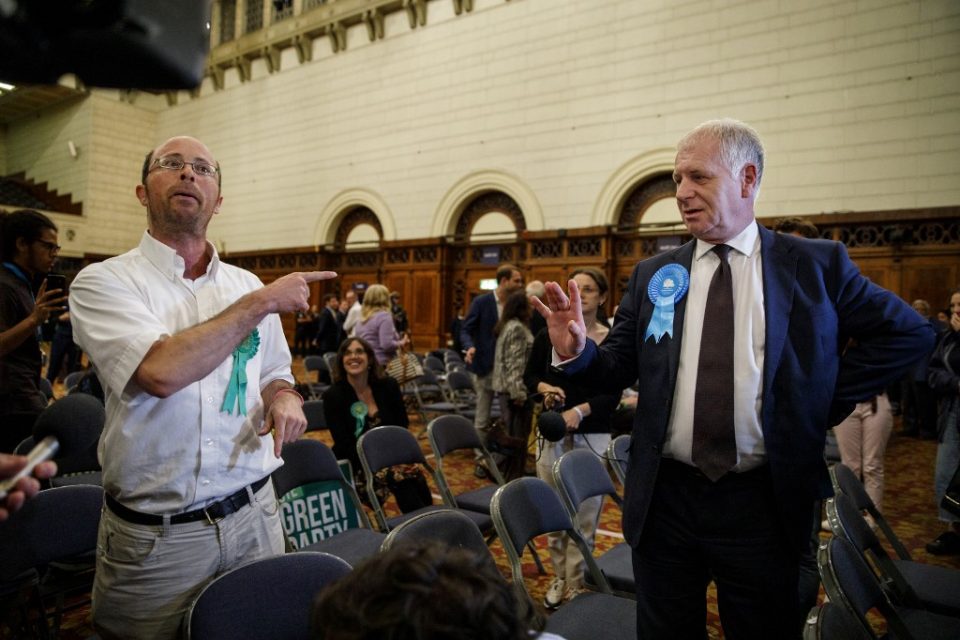
by Lachlan CARMICHAEL
BRUXELLES, Belgium (AFP) — Liberals and Greens say they have broken the two centrist blocs’ grip on power in the European Parliament based on a projected shift in the electoral fortunes of the four.
Liberals and Greens are now pushing harder to snag the head of the European Commission, the 28-nation EU executive, and shape key laws, such as on climate change and taxation.
The center-right EPP (European People’s Party) still has the most seats, followed by the center-left Socialists, but the pair no longer control a majority, according to partial and projected results.
“The monopoly of power is broken,” said Margrethe Vestager, whose Alliance of Liberals and Democrats (ALDE) wants her to head the new commission.
ALDE is projected to have around 100 seats, making it third in the assembly behind some 180 seats for the EPP and 152 for the Socialists and Democrats.
But ALDE and the Greens also hope to work with the EPP and the Socialists to check big gains by Eurosceptics, populist and right-wing parties who could have around 150 seats.
Though power is set to be fragmented, the mainstream, pro-European Union groups still control the lion’s share of the 751-seat assembly.
Vestager alluded to her own credentials for the top job on the Commission, where she served as the anti-trust commissioner and gained a reputation for toughness.
She said EU voters have broken the EPP and Socialist monopoly the way she stopped US hi-tech firms and other multinationals from undermining market competition.
Vestager hailed signals from both the Socialists and the Greens to forge a new kind of coalition “of those who want to take actions progressively to change things.”
The Danish politician said that meant a “different composition of leadership” of the main institutions, long dominated by the EPP and the Socialists.
Manfred Weber, leader of the EPP in parliament, is aiming to succeed fellow group member Jean-Claude Juncker as head of the European Commission.
Debate over the position begins in the next few days.
‘Shrinking center’
The commission is powerful because it plays a key role in drafting laws and rules on the economy, the environment, counter-terrorism, personal data protection, and telecommunications.
Other top positions to be decided following the elections are the head of the European Central Bank and the foreign policy chief.
Vestager also stressed the need for gender balance in the top jobs.
Weber, a German, was subdued when he spoke to journalists in the European Parliament, backed by giant screens where the results were being projected.
“I don’t feel a real powerful victory today,” Weber said after the EPP saw its projected number of seats decrease by around 36 from 216 in the outgoing assembly.
“We are facing a shrinking center,” he added, alluding to both his party’s results and those of the Socialists which held 185 seats in the outgoing parliament.
Esther de Lange, a Dutch EPP member, said her group could still take the lead in negotiations because it remained the biggest group.
But the projected results mark the end of decades of domination by two parties and could lead to more wrangling over jobs and legislation.
Ska Keller, a Greens candidate for the top commission job, told journalists her party’s surge to a projected 70 seats from 51 would usher in a new dynamic.
When asked whether the results could allow the Greens to play kingmaker, Keller replied it could be kingmaker or “queenmaker” given her party’s stand on gender equality.
Her party said it “aimed to deliver on green action, social Europe and democracy.”
ALDE leader Guy Verhofstadt proclaimed his party the real pro-European winner of the elections, with it holding the key to success for the next parliament.
“That means no solid pro-European majority is possible without the participation of our new centrist group,” the former Belgian premier added.
The group will be composed of ALDE, French President Emmanuel Macron’s Renaissance Movement and other “reform-driven, like-minded parties,” Verhofstadt said.
“We will find a majority for the fight against climate change, fairer taxation, completion of the internal market and European solutions for the migration crisis,” he added.
© Agence France-Presse








